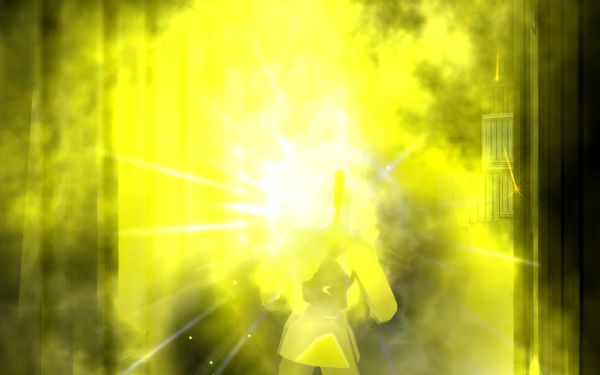
Prayer? Prayer is where you step outside your physical body and into a vast, multidimensional realm where spiritual entities, such as angels and even more incomprehensible beings, serenely bear witness from the sidelines as you rise toward the all-powerful, uncreated Light of all universe to tell It what you think It should do on Earth. Or, alternatively, briefly state the purpose of your visit and attentively wait to learn the will of Heaven. It’s your choice, really. Prayer is what you make it, more or less.
I was honestly planning to write a slice of life entry today, and along comes a llama and asks: “What about prayer?” What about it indeed.
The context was a question about to what extent I think thoughts affect the world, to which I had replied, mostly to the extent that we act on them. This may not seem much, but it is indeed pretty important. We are constantly acting out our thoughts in some form or another, so they contribute greatly to our footprint in this world.
What about prayer? Prayer influences our thoughts. Our thoughts influences our actions. Our actions influences the world. And let me add here that the actual physical horsepower put into our actions is not necessarily the important part. To be at the right place at the right time, to say the right words or do that little thing that needs to be done, can have far greater effects than waving our arms and legs with great energy doing things that could have done themselves without our pushing and pulling, or been done better by others. I don’t claim any perfection in this (which sorts under “wisdom”), but it is a fact. If prayer causes you to be at the right place at the right time, it can have great effect without messing with the laws of nature unnecessarily.
I think a lot of people have met a person, or even an object, that was just at the right place at the right time to change the course of a life. It is rare that anyone just marches straight ahead through life.
Back to prayer. What is it? I should not really be the one to teach you that, since there are people who metaphorically speaking hold a doctorate in prayer while I am still in kindergarten. The writings of some of the old saints are still in print, and there is Holy Scripture. I am not worthy to teach such things. But then I think of some of the stuff that goes as religion on the Net these days, and I hope God will forgive me for saying a few words anyway.
Rattling off your wish list is not an ideal prayer. God is not Santa Claus. (With all due respect for Santa Claus, who was known as a holy man back when he lived in Smyrna.)
Jesus made this a point of teaching. Don’t tell God in great detail what you need, God knows already! Also, don’t use prayer to tell other people how religious you are, that makes your prayer worthless. Pray in secret. Don’t use a lot of words when you pray. This is the teaching of Jesus Christ regarding prayer. He also gave an example prayer, which I trust you know if you are a civilized English-speaker.
Thank you, Jesus. Now back to our scheduled rambling. The purpose of prayer is not magic, or “spooky action at a distance” as Einstein famously described quantum physics. It is no wonder that quantum physics is the darling of the New Age movement, where few if any know more than the Science Illustrated version of what works, much less HOW it works. If you simply referred to the entire quantum science as “spooky action at a distance”, and knew no more of it, this would be enough to fully understand why it gets so much love from my New Age friends.
The purpose of prayer is not to make my favorite football team win the next match, or to ensure that I get the next promotion and my rival does not. These things are an abomination in my eyes, although God may be more tolerant. (He better be tolerant, or I’m in deep trouble, not least for writing about things above my pray grade.)
Let’s cut to the cheese: Spirit rules matter. Matter does not rule spirit. This is how we must understand prayer.
We exist in bodies for the purpose of the spirit, which uses our bodies to unfold our destiny. In addition to destiny there is also fate, which is what the world does to us. Destiny is what we do to the world.
If you are a materialist, you believe that spirit does not exist as such, but that what we call spirit is a side effect of our brain. In that case, the above paragraph makes no sense. And in that case, you probably still have a Bronze Age idea of prayer: I pray to the gods, and make sacrifices, and the gods make sure that I live long and prosper. Now, there is nothing exactly wrong with that, and billions of people have probably lived and died in this worldview. But as a highly refined person living today, you probably find it disturbing and kind of icky, and so you reject religion entirely. Actually it is disturbing and kind of icky. As the old advertisement said: I have upped my standards, now up yours!
To be honest, I still resort to Bronze Age prayer when I get seriously ill. It seems to work too, although I think it is safe to say that at some point I am going to die regardless of prayer.
Back to basics. Because spirit is the first mover, the rightful ruler of the body, it makes no sense for the body-consciousness to use the spirit as a tool. The opposite should be the case: The spirit-consciousness should use the body as a tool.
Bronze Age prayer basically is just this: The body-consciousness (which was pretty much the best that what was available at the time) makes request of the spirit to arrange the outer world for the benefit of the body-consciousness, or Ego.
With the coming of Jesus Christ, things were turned upside down, which is to say, right side up finally. (This was a completion of Judaism rather than a contradiction. Many Rabbis will be able to explain this better than I.) In this new light, the purpose of prayer is that God’s will be done. The priorities then go from God, through the human spirit, and meet the ego at its home turf. This is where the ego ideally resigns its claim to rule: Thy will be done, on Earth as it is in Heaven. Not mine. That is a long canvas to bleach though, or perhaps I am just lazy. A curious passage in the book of Revelation shows the 24 elders throwing down their crowns. I have no idea who the 24 elders are, but throwing down our crowns is the new way of prayer.
Then, if I pray for God to heal me from some illness, the understanding is that this will advance the cause of God or at least my human spirit, which gets time to unfold my destiny. I may technically pray for whatever I honestly believe is in harmony with the Divine will, but I may not pray for what I believe is merely for the benefit of the ego. Past a certain point, such prayers become counterproductive and even dangerous. They are not so at the beginning, but once a certain degree of Light is assimilated, egoic prayer is harmful.
Compare this to someone climbing a mountain, and there is a rope fastened to a spike hammered into the stone. When you are below that point, pulling the rope will haul you upward. When you are above that point, pulling toward it is sheer insanity.
So if someone at my current level of Enlightenment (which admittedly is not very much) were to sincerely pray to God for money, God would quite likely answer: CUT YOUR HAIR AND GET A JOB! or words to that effect. Or as happened when I got a throat infection and prayed to God, he answered my prayer. The answer was GO SEE A DOCTOR. Most of us have the good sense to put the milk in the fridge instead of leaving it out on the table in summer while praying fervently to God to protect it from bacteria. Sometimes a miracle is in order, but the less magic, the better. And the decision is not with the ego.
The early books of Ryuho Okawa are at exactly this level, which is probably why they resonate so strongly with me, even though he thinks he is a God from Venus and I think he is a writer from Japan. In one of them, Okawa writes that “Unlike some religious people, I will not give you money” if you are poor. He does however teach people how to improve their mindset and their work skills. You may have heard the phrase: “Give a man a fish and he has food for a day; teach him to fish and he has food for a lifetime.” Okawa, and I, would probably add that he should also have some fish to give away, if all goes well.
Prayer is a meeting with God, or a representative of God in the spirit world. I think it should be obvious who is in charge of setting the agenda, if all goes well.
In conclusion: Prayer is not a tool for spooky action at a distance. Such a thing may indeed happen, but that is not the purpose of prayer as such. The purpose of prayer is the glory of the Light, and its streaming into the world of matter, so that all things may in the end be sanctified, and Earth be an extension of Heaven, the Realm of Light.
Please bear in mind that there are higher levels of prayer than what I know of, much less practice. Once you are above this, forget it. Step on me and climb higher. That is why I am here. Or so I hope.
***
(And please don’t get the impression that I spend my days entranced in prayer. If I did, when would I get time to play The Sims 2 and City of Heroes?)






